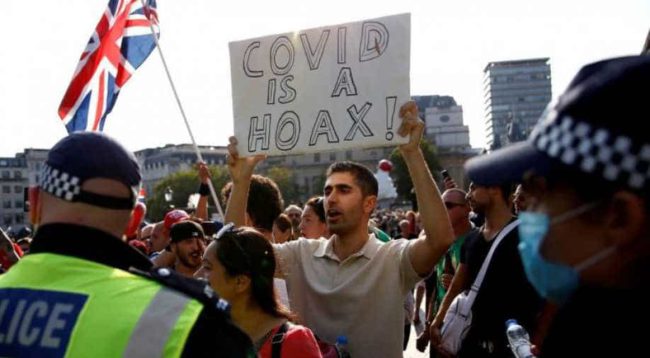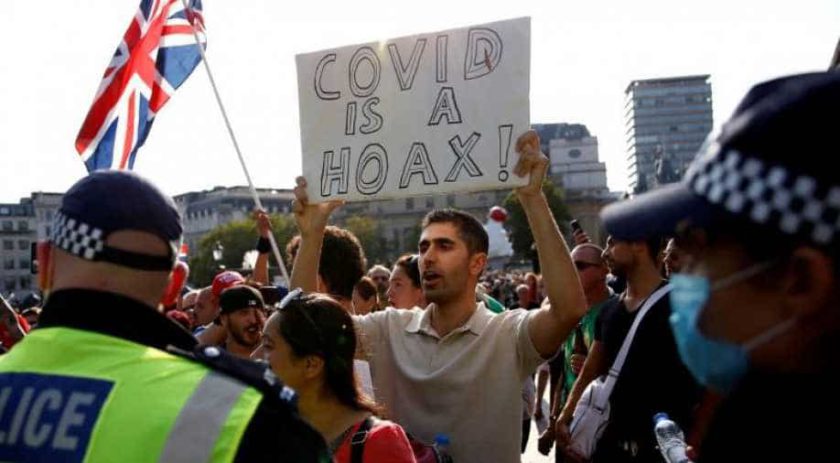
Saturday saw an anti-COVID march take place in London. This consisted of the lunatic fringe who were quite determined to self-certify themselves as idiots and fools.
The BBC’s disinformation specialist reported on the details …
What makes them tick?
A rather fundamental question to ponder over when faced with such silliness is to wonder how people come to conclusions that are so completely out of sync with reality. Examples abound; flat earth beliefs; 6,000 year old beliefs, and in this case outright denial that COVID exists or that vaccines are effective and safe.
We all generally tend to use two ways of thinking. These can be summed up as follows …
Analytical – We assess the available information that we have, or is available, and use that to come to conclusions. Doubt is perhaps a fundamental aspect. For example if we see a park bench with a “Wet Paint” sign on it, we might not take in at face value, but test it by gently touching to see if the paint is truly still wet. In other words, this perhaps also involves data gathering to come to a conclusion. If new information comes to light we might then change our minds.
Intuitive – We roll with a gut response. This is essentially a deep down emotional response. Often what drives this is that we take a cue from those around us. For example, some vote because the candidate wears the right colour badge (Blue or Red), and so regardless of actual policy proposals, we lean that way because they are deemed to be our tribe.
Generally we tend not to exclusively use either way of thinking. Instead, most will tend to use both. What is also true is that one of these will dominate and so takes preference.
A leaning towards intuitive thinking need not imply that we will come to an incorrect conclusion. However, combine this with deep seated fears, insecurity, and general feelings of no control, and we then lean towards easy answers that fill such an emotional vacuum.
A Little Bit of Missing Information?
It might be tempting, when faced with the lunatic fringe, to consider that they are simply missing a bit of information and so imparting that missing information will soon sort things out.
Nope.
If you have made an emotional commitment to an idea, a truly daft belief, one that brings a sense of control and brings purpose, then no amount of factually correct information will alter that.
They might indeed merit scorn and mockery, but the truth is that they perhaps deserve our pity.
To truly engage you need to find a better way to meet the emotional need than the daft idea that is being embraced. That can take considerable time, effort, patience, and compassion.
What now?
The looming challenge fast approaching for society is what now happens?
We need enough people to be vaccinated if we are ever to truly get to the end-game. So what happens when faced with a large subsection of society that sincerely believes that vaccines are evil and the COVID is a hoax, how do we respond to that, how should we respond to that?
Medical ethics 101 – you can’t impose any medical intervention by force. Even if it was decreed, no doctor would be willing to breach basic medical ethics and vaccine people against their will.
At the moment the demand for vaccines is greater than the supply of vaccines, so the uptake is still increasing. There soon comes a tipping point where all those that want a vaccine have received one.
What happens then if that is simply not a high enough percentage?
Vaccine Passports are perhaps Inevitable
Love them or loath them, it is perhaps inevitable that vaccine passports are coming.
Rather obviously when crossing international borders, in or out, other nation states will insist. The UK will most probably strive to do the same.
Will we also use them internally for attendance at any large gatherings that have the potential to be super-spreader events?
What about smaller events, pubs, clubs, restaurants, etc…
This is something that really does need debate now, because soon the time for talking will have passed.
One other twist to all of this is a lack of information. There is also a great deal we simply don’t know. For example …
- How long do vaccines protect?
- Do the available vaccines protect against variants?
- etc…
Without knowing any of that, it becomes very challenging for decisions on a vaccine passport to be made.
